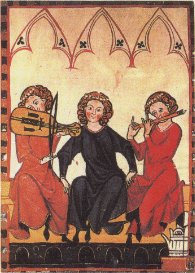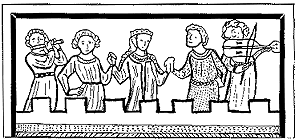What's the medieval music ?
Our past is our futur : let us cultivate it
Because all ages have their own musical
expression music is timeless. Because it comes from our distant past,
mediaeval music tells us a story, that of our history. It concerns us,
tells us where we come from, who we are, it identifies our cultural
roots, deepens our sense of response to music and kindles our need for
spirituality.
MEDIEVAL MUSIC
Few traces remain of the music played before the 10th century. The art of singing is the only one that can be traced back because of long religious traditions and the influence of the mediterranean culture. In St Gall, in Switzerland, in the year 900, appeared the very first manuscript that contains a musical piece written in neume. It was the heyday of Gregorian plainsong.

As far as lay music is concerned we have to wait until the 11th century before the first TROUBADOUR appeared : his name was Guilhem d'Aquitaine, and for 2 centuries some 350 troubadours sang God, the Vir gin Mary, war, revels and love...
These tro ubadours used to live in the "Pays d'Oc" (Southern France) while in the "Pays d'Oïl" some 600 trouvères travelled the north of France bringing with them the art of singing (cansos) as well as the art of poetry.
Their monodic melodies were sometimes accom-panied on a musical instrument - occasionally backed by a musical line sung at the fifth. Frequently the TROUVEURS (Troubadours - Trouvères) wrote music that they asked jugglers and minstrels to perform on their behalf.
Simultaneously converging with the art of the Troubadours and borrowing mainly from gregorian plainsong, a new form of music developed, a more complex kind of music of religious inspiration. The melodies then created combined with one or two counter melodies thus giving birth to a true form of polyphony (Ars nova).

Mediaeval music is fraught with powerful images associated with the ideas of dream, fantasy, conquest, the development of a fabulous and much envied architectural patrimony. The wealth of this imagery bear s witness to the timelessness of those human values produced by man's thirst for knowledge, courtly love, longing for thruth. Indeed it represents the fundamental values of the new Man, of the new Entreprise always trying to devise new ways to further communication, creation.
Mediaeval music emerged from a cultural melting-pot essentially constituted by the import of the products of the Indo-Arab civilisation gradually incorporated into the initial Judeo-Christian civilization.
The oustanding feature of Mediaeval music is its ability to integrate into our modern cultures the perenity of the Mediaeval language, the basis of a stability which so many of our contemporaries seek so desperately.
